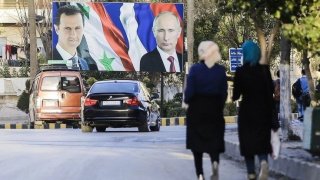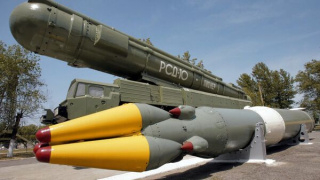Russia’s Role In Vietnam’s Balancing Act
Reports about President Putin’s impending trip to Vietnam later this week drew fresh attention to this ASEAN member’s foreign policy after his plans elicited a sharp response from the US. An embassy spokesperson in Hanoi told Reuters that “No country should give Putin a platform to promote his war of aggression and otherwise allow him to normalise his atrocities. If he is able to travel freely, it could normalize Russia's blatant violations of international law.”
This rebuke was hegemonic and hypocritical, the first because the US has no right to tell Vietnam which leaders it’s allowed to host and the second because none of these three countries recognizes the “International Criminal Court” which issued a “warrant” for his arrest on false pretexts last spring. The larger context within which this statement was issued concerns Vietnam’s balancing act between Russia and the US, which is predicated placing itself in the best possible position vis-à-vis China.
Russia has remained Vietnam’s most important military partner despite the end of the Old Cold War and the latter’s subsequent rapprochement with its wartime American enemy. Almost all of its wares are still Soviet or Russian, and Hanoi depends on Moscow for bolstering its ability to defend its claims to the South China Sea (which Vietnam calls the East Sea) from Beijing. Those two have been unable to reach an agreement over this issue, though they’ve responsibly managed their differences for the most part.
Although China is considered to be Russia’s top strategic partner, this hasn’t come at the expense of its strategic relations with Vietnam, who it continues to arm in spite of this. From Moscow’s perspective, it’s maintaining the balance of power between them, thus reducing the risks that one of them might make unilateral moves that could lead to a war by miscalculation. If Vietnam replaced its Soviet/Russian arms with Western ones, then the US might encourage it to more muscularly stake out its claims.
Another important point is that the “Joint Statement on 2030 Vision for Development of Viet Nam-Russia Relations” that was agreed to during former Vietnamese President Nguyen Xuan Phuc’s trip to Moscow from 29 November-2 December 2021 strongly suggests Russian support for Vietnam’s maritime claims. The United Nations Convention on the Law of the Sea 1982 is referenced a total of three times and referred to as “the legal basis for any activity at sea and in the oceans”.
This insight adds context to Reuters’ report from May 2018 regarding China’s opposition to Rosneft drilling in Vietnamese-controlled but Chinese-disputed waters. While the level of coordination between that company and the Kremlin on this specific issue remains unclear, the importance rests in the fact that it suggested at least tacit Russian recognition of Vietnam’s claims. It’s also significant that the incident was peacefully defused, which speaks to all three sides’ maturity in handling this sensitive dispute.
It's an understandably emotive one for China and Vietnam since each considers it integral to their respective national interests, but having Russia as a shared strategic partner helps manage their differences. In the best-case scenario, they might both request its mediation in brokering a lasting agreement between them, though that’s still a far way from happening. The reason why it’s not likely anytime soon is because Vietnam elevated its relations with the US to the strategic level last September.
Trade and technology are at the center of their contemporary ties, but Vietnam also regards the US as a military counterweight to China and believes that its regional naval presence complements its own Russian-bolstered deterrence capabilities vis-à-vis China. China is still Vietnam’s top trade partner while Vietnam is now China’s largest one in ASEAN, and they’re also planning high-speed rail connections, but Hanoi won’t let Beijing leverage this to its advantage in resolving their dispute in its favor.
The US’ regional naval presence has emboldened the nearby Philippines to more muscularly stake out its claims, which has diverted China’s attention from its dispute with Vietnam in recent years and accounts for why there hasn’t been much dynamism on that front, but Vietnam still doesn’t trust the US. Unlike the Philippines, Vietnam isn’t the US’ mutual defense partner to which legal guarantees have been extended, nor does it want to enter into any such relationship since it treasures its strategic autonomy.
That’s why it remains reluctant to purchase Western arms, especially since any such announcement could immediately worsen ties with China seeing as how the People’s Republic would likely suspect that Vietnam might be planning subsequently unilateral moves in their disputed waters with US backing. The complex economic interdependence between Vietnam and China that was forged in the decades since their brief 1979 war also serves as a safeguard against that ASEAN state ever seriously considering this.
Vietnam instead prefers to continue purchasing Russian arms even in spite of its newly clinched strategic partnership with the US and the Damocles’ sword of secondary CAATSA sanctions since it doesn’t expect China to overreact to it maintaining these decades-long military ties with their shared strategic partner. These calculations place into context the New York Times’ report from last September regarding its allegedly secret plans to purchase $8 billion worth of modern arms from Russia over the next 20 years.
It wasn’t mentioned in their report, but one of them might very well end up being the BrahMos supersonic missiles that Russia jointly produces with India, with Sputnik reporting last month that Vietnam showed a keen interest in them during a defense expo in Malaysia at the time. Most observers might have missed it, but Russia approved India’s export of these arms to the Philippines earlier this year even though it’s one of the US’ mutual defense allies and regularly antagonizes China nowadays.
Despite the Philippines’ anti-Chinese and pro-American foreign policy, it still became the first country to purchase the jointly produced BrahMos missiles, and ties with Russia remain cordial after they reconvened a joint trade summit last October and are exploring an oil deal. Russia’s ties with Vietnam are much closer, it’s not under US influence, and its tensions with China are more manageable, so it therefore follows that Vietnam might naturally purchase the BrahMos after the Philippines already did.
These systems could be part of the multibillion-dollar arms package that President Putin will likely discuss during his impending trip to Vietnam, which might also include an energy dimension as well if the mutual political will exists to once again drill in Chinese-claimed waters. Whatever the outcome may be, and it could take time to fully unfold since whatever they agree to might not be publicly disclosed in full, the most important point is that it’ll be aimed at assisting Vietnam’s careful balancing act.











